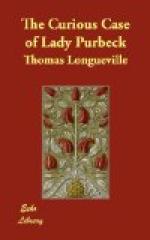Elizabeth, grand-daughter of the great Lord Burghley, and daughter of Burghley’s eldest son Thomas Cecil, some years later Earl of Exeter, had been married to the nephew and heir of Lord Chancellor Hatton. Not very long after her marriage her husband had died, leaving her childless and possessed of the large property which he had inherited from his uncle. This young widow was a woman not only of high birth, great riches, and exceptional beauty, but also of remarkable wit, and, as if all this were not enough, she had, in addition, a violent temper and an obstinate will. This Coke found out in her conduct respecting a daughter who eventually became Lady Purbeck, the heroine of our little story.
Romance was not wanting in the Attorney-General’s second wooing; for he had a rival, whom Lord Campbell in his Lives of the Chief Justices, describes as “then a briefless barrister, but with brilliant prospects,” a man of thirty-five, who happened to be Lady Elizabeth’s cousin. His name was Francis Bacon, afterwards Lord Chancellor, Baron Verulam, Viscount St. Albans, and the author of the Novum Organum as well of a host of other works, including essays on almost every conceivable subject. In the opinion of certain people, he was also the author of the plays commonly attributed to one William Shakespeare. This rival was good-looking, had a charming manner, and was brilliant in conversation, while his range of subjects was almost unlimited, whereas, the wooer in whom we take such an affectionate interest, was wrinkled, dull, narrow-minded, unimaginative, selfish, over-bearing, arrogant, illiterate, ignorant in almost everything except jurisprudence, of which he was the greatest oracle then living, and uninterested in everything except law, his own personal ambition, and money-making.
Shortly before Coke had marked the young and lovely Lady Elizabeth Hatton for his own, Bacon had not only paid his court to her in person, but had also persuaded his great friend and patron, Lord Essex, to use his influence in inducing her to marry him. Essex did so to the very best of his ability, a kind service for which Bacon afterwards repaid him after he had fallen—we have seen that his star was already in its decadence—by making every effort, and successful effort, to get him convicted of treason, sentenced to death, and executed.
Which of these limbs of the law was the beautiful heiress to select? She showed no inclination to marry Francis Bacon, and she was backed up in this disinclination by her relatives, the Cecils. The head of that family, Lord Burghley, Queen Elizabeth’s Lord High Treasurer, was particularly proud of his second son, Robert, whom he had succeeded in advancing by leaps and bounds until he had become Secretary of State; and Burghley and the rest of his family feared a dangerous rival to Robert in the brilliant Bacon, who had already attracted the notice, and was apparently about to receive the patronage, of the Court. If Bacon should marry the famous beauty and become possessed of her large fortune, there was no saying, thought the Cecils, but that he might attain to such an exalted position as to put their own precocious Robert in the shade.




